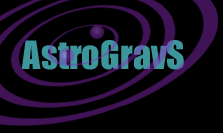
News /
Reports
Images & Movies
Links
Jobs
-
Job postings may also be found at
the AAS Job Register.
Jump to:
Postdoctoral Positions in Gravitational Wave Astrophysics at GSFC (Nov 1 deadline)
Tenure-Track Assistant Professor Computational relativity at LSU (Dec 1 deadline)
Postdoctoral Position at Cornell University (Dec 15 deadline)
Postdoctoral Positions in Gravitational Wave Astrophysics at GSFC
-
Deadline: November 1, 2003
The Gravitational Wave Astrophysics Group at NASA's Goddard Space Flight Center is seeking candidates for postdoctoral fellowships in theoretical (including computational) and experimental research. Specific areas of focus are astrophysical gravitational wave source modeling and scenarios, gravitational wave data analysis, numerical relativity, and technology development for space-based laser interferometry.
This group is located within the Laboratory for High Energy Astrophysics (LHEA) at Goddard, which is the lead center for NASA's role in the Laser Interferometric Space Antenna (LISA). The theoretical work in this group is focused on calculating and analyzing the gravitational wave signatures from astrophysical sources of interest to the space-based LISA detector as well as to ground-based interferometers such as LIGO, Virgo, and GEO. Our research interests include numerical relativity, with an emphasis on binary black hole coalescences and adaptive mesh refinement, and gravitational wave data analysis. We are also interested in more general astrophysical work in gravitational wave phenomenology and source scenarios. The experimental focus of the group is in the area of technology development for the LISA mission, focusing on materials stability, optical metrology, laser stabilization and micronewton thruster testing.
These postdoctoral fellowships are available through the National Research Council (NRC). There are 4 applications deadlines per year, and successful candidates have great flexibility in choosing their starting dates. The next deadline for applications is November 1, 2003
More details, and links to the application forms, can be found
at
Tenure-Track Assistant Professor Computational relativity at LSU
-
Deadline: December 1, 2003
The department of physics and astronomy at the Louisiana State University and the Center for Applied Information Technology and Learning at LSU (CAPITAL) invite applications for an assistant professorship in physics starting in the fall of 2004. Applicants must have a Ph.D. or equivalent degree in astronomy, physics, or related fields. The successful candidate is expected to teach at both the undergraduate and graduate levels and establish a vigorous research program in the area of computational relativity, with preference for candidates working on the two body problem in general relativity.
The astrophysics and relativity group at Louisiana State consists of Gabrielle Allen, Peter Diener, Juhan Frank, Luis Lehner, Jorge Pullin, Ed Seidel and Joel Tohline. LSU is also home to a strong experimental gravitation group (Joe Giaime, Gabriela Gonzalez, William Hamilton, Warren Johnson), hosting the only operating bar detector in the US and with strong ties to LIGO (the Livingston site is located at 30 miles from LSU). LSU is also home to strong research activities in space science/astroparticle physics, observational astronomy, high energy physics, nuclear, medical, atomic and condensed matter physics.
The CAPITAL initiative is a Louisiana funded effort directed by Edward Seidel and with a permanent budget of $8 million/yr to enhance the information technology infrastructure in the state. As part of the initiative, LSU now hosts the fastest supercomputer in the world operated solely by a university, a 1024 node beowulf cluster.
Salary will be commensurate with qualifications and experience. Application deadline is December 1st, 2003 or until a suitable candidate is selected. Applicants should send a vita, a description of research interests and experience, and three letters of reference to:
Dr. Roger Mc. Neil, Chairman
Department of Physics & Astronomy
Louisiana State University
202 Nicholson Hall
Baton Rouge, LA 70803-4001
LSU is an Equal Opportunity/Equal Access Employer
Postdoctoral Position at Cornell University
Deadline: December 15, 2003Cornell University expects to have an opening for a research associate in general relativity starting in September, 2004. Experience in classical general relativity, gravitational wave astronomy, numerical relativity, or relativistic astrophysics is desirable for this position, and preference will be given to applicants with experience in numerical relativity. The position is for one year, with subsequent renewals depending on performance and the availability of funds. The Cornell Relativity Group consists of Eanna Flanagan, Saul Teukolsky, James York and research associate Larry Kidder. There will also be opportunities to interact with the Theoretical Astrophysics Group, including David Chernoff, Dong Lai, Richard Lovelace, and Ira Wasserman. Applicants should submit a resume with a list of publications, and arrange for three letters of recommendation to be sent to:
Sharon Falletta
Space Sciences Building
Cornell University
Ithaca, NY 14853-6801
Completed applications should be received no later than December 15, 2003. Only candidates who anticipate receiving their Ph.D. by September 2004 should apply. Cornell is an Equal Opportunity/Affirmative Action Employer.